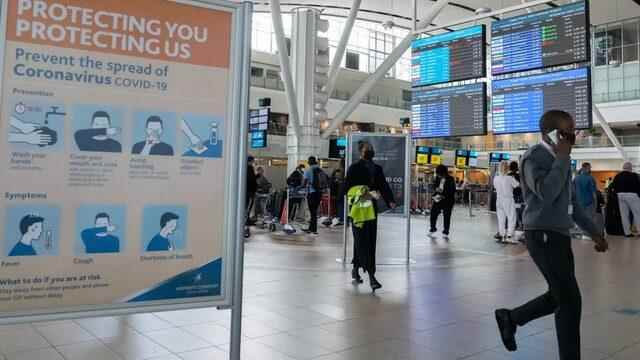South African President Cyril Ramaphosa condemned the travel restrictions imposed on his country and some African countries due to the Omikron variant.
President Cyril Ramaphosa also argued that the restrictions were far from scientific.
The World Health Organization placed the Omicron variant on Friday evening in the “variant of concern” category.
The UK brought back the red list application on this development. For travel from South Africa to the UK, hotel quarantine will be mandatory until further notice.
27 member states of the European Union also decided to ban temporary travel to 7 African countries, including South Africa.
After these developments, South African President Cyril Ramaphosa, who appeared before the cameras on Sunday, called for the immediate removal of restrictions.
Arguing that the imposed restrictions are not scientific and fair, Ramaphosa said he was “deeply disappointed”.
Noting that the restrictions will not stop the spread of the variant, Cyril Ramaphosa said, “The only thing the bans will do is to do more damage to countries whose economies have already been damaged by the epidemic.”
Accusation of “afrophobia”
The South African President also argued that the only way to prevent new variants is to address vaccine injustice.
President of Malawi, Lazarus Chakwera, from the countries where the travel ban is applied, accused the Western countries that apply the restriction with “Afrophobia”.
The variant, which was detected in South Africa earlier this month, was reported to the World Health Organization last Wednesday.
Cases associated with the Omicron variant, which is considered to have spread to many parts of South Africa, have also been detected in Europe and the UK.
Matshidiso Moeti, Africa Director of the World Health Organization, also underlined this development and made a statement.
Moeti said the variant has been seen in many parts of the world, adding that “Travel restrictions targeting Africa are undermining global solidarity.”
G7 health ministers meet
However, Professor Mary-Louise McLaws, a consultant to the same institution, argued that travel restrictions are necessary to stop the spread, in her assessment to the BBC.
Developments and explanations about the new variant will be at the forefront of the agenda this week.
The health ministers of the G7 countries will meet in an emergency meeting on Monday.
Border controls will also be discussed at the meeting, which will be held at the call of the UK.
There are news from many countries about the Omikron variant, which continues to spread:
The Netherlands has so far been the country with the highest number of Omicron variants detected in Europe. The variant was found in 13 of 600 people who came to the country from South Africa.
Also in UK public transport and in shops Reintroducing the obligation to wear masks. The first two cases detected in the country were seen in Essex and Nottingham.
In Israel, where the Omikron variant is seen, the government has closed its borders for 14 days. decided to close it to all foreigners. 3-day mandatory quarantine for Israelis who have received two doses of vaccination upon entry; Unvaccinated Israeli citizens are required to quarantine for 7 days.
